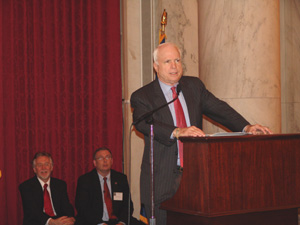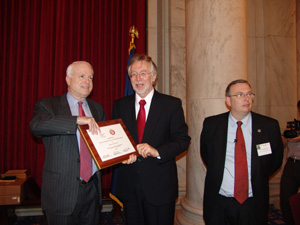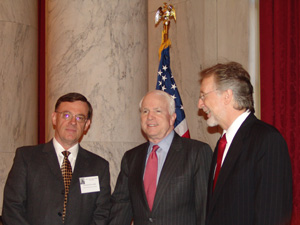United States: Sen. McCain Tells Adventists America's Leadership Tied to Its Moral Standing
News May 2006

Senator John McCain speaks at the Liberty dinner
"America truly is not like past superpowers, countries who sought territorial gain or imperial dominion," United States Senator John McCain of Arizona told attendees at a dinner sponsored by the International Religious Liberty Association (IRLA), Liberty magazine and the North American Religious Liberty Association (NARLA), three religious freedom outreaches sponsored by the Seventh-day Adventist Church.
"We wish to free, not to enslave; to trade, not to steal; to enlighten and learn, not to dominate and convert. ... Our moral standing is directly tied to our ability to maintain America's preeminent leadership in the world," he declared.
McCain's remarks were the keynote of the fourth annual religious liberty dinner sponsored by the IRLA, NARLA and Liberty magazine; each has been held in the historic Senate Caucus Room on Capitol Hill, where some of America's most important hearings have taken place.
"It's no surprise that the many Seventh-day Adventists here tonight seek the freedom to practice their faith -- after all, Adventists have often faced serious discrimination around the world," McCain said. "What is remarkable, what is truly impressive about your work, is that you seek freedom not just for people of your faith, but also for those of all other religions. Your work on behalf of religious freedom and human rights is vital, it is transforming, and it is inspiring. And for it, the world owes you a deep debt of gratitude."

Senator McCain receives the award from Dr. John Graz and Attorney James Standish
A gathering of approximately 300 filled the banquet room. Along with Adventist religious liberty activists were representatives of other faiths, including Islamic, Jewish, Catholic and Protestant groups, as well as Congressional staffers.
McCain argued for a United States foreign policy that seeks to advance universal human rights: "I believe that the object of American power should not be limited to our own protection and economic self-interest," he said. "We must seek a better world, one respectful of the rights we believe to be the universal province of all people. To do less would not simply threaten the very interests we seek to protect; it would also mean abdicating American leadership at this unique moment in history."
He continued, "The promotion of those rights is the most authentic expression of our national character. To accept the abridgement of those rights for other societies should be no less false to the American heart than to accept their abridgement in our own society. Injustice and tyranny abroad should be as intolerable to Americans as they are intolerable here."
Citing recent problems at the Abu Ghraib prison in Iraq, McCain, himself a survivor of torture as a prisoner of war in Vietnam's infamous "Hanoi Hilton," said the nation must do better: "Because we hold others to a standard, we must be even more scrupulous in our own affairs. This does not mean that America has always been perfect. Nor does it mean that we are perfect today. But we must strive for perfection, whether it means interrogating enemy detainees in accordance with our values or treating immigrants as individuals possessing of certain basic human rights. Only by acting in accordance with our values can we further the interests we seek abroad."
Noting some global progress on the issue of freedom of religion, McCain added that there was still some ways to go.

L to R: Dr. Jonathan Gallagher, Senator John McCain, Dr. John Graz
"Every time a Chinese Catholic is jailed, or an Afghan convert is arrested, or a Hindu is killed in Kashmir, or a Tibetan Buddhist oppressed, it is not simply a tragedy. It is a call for action, one worthy of this country founded on the principle that every person, possessing inalienable rights, deserves to be free," he said.
According to Dr. John Graz, public affairs and religious liberty director for the Seventh-day Adventist world church and secretary-general of the IRLA, the annual dinner has taken on a measure of importance as a valuable human rights forum.
"This dinner has become a major event for religious liberty in Washington, which is the political capital of the world," Graz said. "It is an extraordinary privilege to make our message of religious liberty known among those who have responsibilities and can have an influence in the world today."
Also speaking at the event was U.S. Representative Roscoe Bartlett, of Maryland, a Seventh-day Adventist who was honored for his religious freedom efforts. Bartlett said he believed America's unique status in the world stems in part from its commitment to individual liberty.
The dinner also featured awards to several individuals who have helped in religious liberty issues: Nathaniel Higgs, retiring public affairs and religious liberty director for the Southern Union of Seventh-day Adventists; Robert Nixon, recently retired vice president of the IRLA; attorney Jeffrey A. Berman of Sidley Austin LLP; and Professor W. Cole Durham, an attorney and law professor at Brigham Young University in Provo, Utah.
A special presentation of the A.T. Jones medal was made to California flight attendant Deborah Fountain, who lost her job with a major airline because of her refusal to work on Sabbath. She regained the position when the airline agreed to accommodate her needs. [ANN]